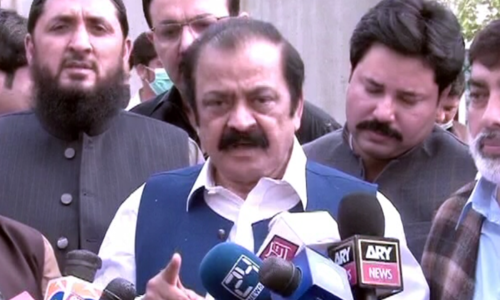ISLAMABAD: The National Accountability Bureau (NAB) on Thursday approached the Supreme Court with appeals against bail granted to three PML-N leaders facing corruption references, Shahid Khaqan Abbasi, Ahsan Iqbal and Miftah Ismail.
The Islamabad High Court (IHC) had granted post-arrest bail to Mr Ismail on Dec 23, 2019, and to Mr Abbasi and Mr Iqbal on Feb 25, 2020.
Former prime minister Abbasi and former chairman of the Sui Southern Gas Company Ismail were arrested by NAB on July 18, 2019, and August 7, 2019, respectively, on the allegations of irregularities in the LNG terminal and branch pipelines project that allegedly culminated in causing huge loss to national exchequer on the complaint of Sheikh Rashid Ahmed. Later NAB received a number of complaints from other sources.
Former planning, development and reforms minister Iqbal was arrested by NAB on Dec 23, 2019, on the charges of being instrumental in enhancing the scope of the Narowal Sports City (NSC) project, which was initially launched at the cost of Rs35 million, without formal approval by the Central Development Working Party.
According to NAB, the NSC project was illegally taken over by the federal government from the Punjab government on the directive of Mr Iqbal who, after high-jacking the provincial project, allegedly directed the design consultants of the project to enhance the scope of the projects manifolds.
NAB accused that the revision of the project resulted in a revised PC-1 amounting to about Rs2.49 billion.
The appeals which were filed by the additional prosecutor general of NAB on behalf of the bureau chairman request the Supreme Court to set aside the IHC orders in the interest of justice by granting leave to appeal and examine legality, propriety and vires of the high court orders.
The appeal contended that the IHC while granting bail to the accused ignored to follow the principles enunciated by a larger bench of the Supreme Court in the 2019 Tallat Ishaq case.
In the Tallat Ishaq case, Justice Asif Saeed Khosa, as he then was, had regretted that the original intent behind introduction of Section 9(b) of the National Accountability Ordinance (NAO) of ousting jurisdiction of the courts regarding grant of bail in a case stood neutralised by opening the door to bail through exercise of constitutional jurisdiction of a high court.
Resultantly the entire burden was being shouldered by the high courts, which was a huge and an unnecessary drain on their precious time, Justice Khosa had written.
He had suggested to the legislature to consider amending the NAO to enable an accused person to apply for bail before the relevant accountability court in the first instance instead of directly approaching a high court.
Likewise, NAB also pleads before the Supreme Court that the IHC was bound by virtue of Article 189 of the Constitution to consider extraordinary circumstances and extreme hardship enunciated by the apex court.
Moreover, the high court while granting the bail to the accused persons considered their cases as ordinary criminal cases while ignoring that they were charged for corruption and corrupt practices under a special law wherein the operation of Section 497 the Criminal Procedure Code is ousted, the appeals argue.
The high court orders are not sustainable in the eyes of the law, the appeals say, adding that discretionary powers conferred on the high court were exercised in a routine, mechanical and arbitrary manner and hence the orders are liable to be set aside.
Published in Dawn, July 9th, 2021














































